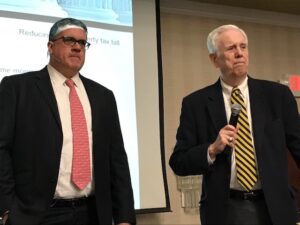We’ve heard it said a million times (and said it ourselves a million more), “the recent sale price of a piece of real estate is the best evidence of its value.” And the concept of sales price as value is so ingrained in our minds that we sometimes forget that this is just shorthand, that the actual language of the statute is what matters; and, ultimately, what must be proven before the board of revision or the board of tax appeals.
“In determining the true value of any tract, lot, or parcel of real estate under this section, if such tract, lot, or parcel has been the subject of an arm’s length sale between a willing seller and a willing buyer within a reasonable length of time, either before or after the tax lien date, the auditor may consider the sale price of such tract, lot, or parcel to be the true value for taxation purposes.” R.C. 5713.03
What is “Arm’s-Length”
What the actual language of the statute means is that the sale has to be arm’s-length: “A transaction between unrelated parties under no duress.” (Appraisal Institute). Boards of Revision and the Board of Tax Appeals look for the following factors when determining whether a sale price should be adopted as the true value:
- Buyer and Seller are typically motivated.
- Both parties are well informed or well advised and each is acting in his/her own best interest.
- A reasonable time is allowed for exposure in the open market.
- Payment is made in terms of case in U.S. dollars or financial arrangements comparable thereto and
- The price represents normal consideration for the property sold, unaffected by special or creative financing or sales concessions granted by anyone associated with the sale.
The Board of Revision
Recently Ohio’s Ninth District Court of Appeals upheld a decision by the Board of Tax Appeals to reverse the decision of the Summit County Board of Revision to adopt the online auction price as the true value.
In Green Local Schools Board of Education v. Manolakis, et al. 2019-Ohio-4250, the property owners initially filed a complaint with the Summit County Board of Revision seeking to lower the value of their home from $1,498,350.00 to $836,300 – the owners’ purchase price in an online auction. Before the Board of Revision, the owners explained that the property had been subject of a sheriff’s sale and that the foreclosing bank had purchased the property at that sale. A few months later, the bank placed the property for sale via an online auction site, hubzu. The owner’s put in a bid and won.
The Board of Revision accepted the owner’s testimony and adopted the sale price. However, the school board appealed to the Board of Tax Appeals and pointed to a lack of evidence supporting a finding that the auction was “arm’s-length.”
The Board of Tax Appeals
After the property owners prevailed at the Board of Revision, the local school board (which typically receive 60-70% of the property tax collections) filed an appeal arguing that the owners did not meet their burden to show that the sale was “arm’s-length.”
The owners testified at the Board of Revision that they had no relationship with the seller but were unable to provide any information about the bank’s motivation in selling. Notably, the owners were unable to show that the property had been marketed for sale other than via a sign in the yard of the property one week before the auction, or whether there was a minimum bid for the auction, or any other bidders.
Another problem for the owners is that they agreed to let the Board of Tax Appeals decide the case without putting on any additional evidence. So the owners forfeited the right to supplement the evidence to bolster their claim that the sale was arm’s-length.
The Board of Tax Appeals, looking only at what was before the Board of Revision found that there was not enough evidence in the record to show that the sale was arm’s-length. And, once the sale price was disregarded, the only evidence of value was the auditor’s original value. So the Board of Tax Appeals reinstated the auditor’s value $1,498,350.00.
The Court of Appeals affirmed the decision of the Board of Tax Appeals, finding that “we cannot say that the BTA was unreasonable in concluding that the evidence of value presented by Mr. and Mrs. Manolakis to the BOR was not sufficient.”
The Lesson
Don’t take the Board of Revision process lightly. This is a serious endeavor – particularly when you are seeking a substantial reduction in value. Remember, when you bring a challenge to the Board of Revision it is your burden to prove that your proposed value is right and that the auditor’s value is wrong. Bring everything you can think of to prove your case. And if there is an appeal, take the opportunity to bring in additional evidence to bolster your case.
Your Case
Finney Law Firm has represented commercial and residential property owners (and one school board) before the Boards of Revision throughout Ohio and before the Ohio Board of Tax Appeals in property tax valuation challenges.
Every case should be evaluated based on its own unique set of circumstances. The time to file a challenge begins January 1 of each year and ends March 31. If you have questions about the value of your property, or if you recently purchased property at a price less than the auditor’s value, we can help. More information about the property tax valuation process is available here.
Contact Christopher P. Finney at 513-943-6655 or contact us here.





